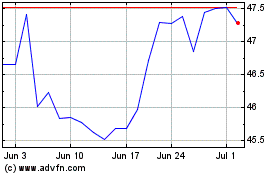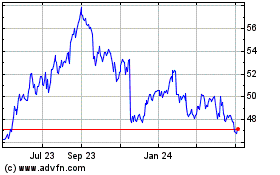By Don Clark
Computer scientist David Cheriton has been a quiet force behind
the scenes in Silicon Valley for decades, using his brains and bank
account to fund vendors of equipment that transmits data between
computers and over the Internet. Now he wants the customers of
those suppliers to feel free to shop elsewhere.
The Stanford University professor, whose early investment in
Alphabet Inc.'s Google helped make him a multibillionaire, recently
bankrolled a startup called Apstra, which has been working on
software for managing networking devices from multiple vendors.
Apstra's software makes it easier to integrate equipment from
various suppliers as better options come along, Mr. Cheriton
said.
It could reduce customers' reliance on vendors like Cisco
Systems Inc.--which first made Mr. Cheriton wealthy in 1996 when it
bought a startup he co-founded--and Arista Networks Inc., a leading
maker of network switches that he co-founded in 2004.
Network hardware companies tend to lock in customers as they
develop expertise in running particular systems and become
accustomed to proprietary features.
Customers "are not able to make a best-of-breed sort of buying
decision, " he said. With Apstra, "we enable the customer to make
the best decision."
Such free thinking is nothing new for Mr. Cheriton, who recently
was embroiled in a suit that created conflicts with Andy
Bechtolsheim, his longtime partner and a renowned engineer and
entrepreneur.
Intel Corp. expects to include some of Mr. Cheriton's ideas in
future computer chips.
In a little-noticed move, the technology giant in 2014 purchased
Hicamp Systems Inc.--a tiny company that Mr. Cheriton helped start
to improve the efficiency of memory circuitry--and he became a
senior fellow at Intel.
He has funded 20 companies to date, by his own count.
"Some people would say he is a contrarian," said Sam Liang, a
former student of Mr. Cheriton who built and sold a startup called
Alohar Mobile that received funding from him. "But he is usually
proven correct after a few years."
Mr. Cheriton cemented his contrarian reputation in the 1990s,
when he campaigned against a networking technology called
asynchronous transfer mode, or ATM, that was favored by telephone
carriers.
He preferred Ethernet, which he saw as a simpler, proven option.
Ethernet gradually trumped alternatives.
"I saw this ship of fools sailing along," he said. "The
technology made no sense."
Antipathy toward ATM was something that Mr. Cheriton shared with
Mr. Bechtolsheim, a German-born hardware designer who in 1982 had
co-founded Sun Microsystems Inc. The pair started Granite Systems
Inc., a maker of Ethernet switching systems that Cisco purchased in
1996 for $220 million in stock.
Their biggest windfall sprang from a meeting in 1998 on Mr.
Cheriton's front porch.
There, Mr. Cheriton introduced Mr. Bechtolsheim to Google
founders Larry Page and Sergey Brin and received a quick laptop
demonstration of their nascent search engine.
Mr. Bechtolsheim ran to his Porsche to write out a $100,000
check to Google Inc. before the company was incorporated, and Mr.
Cheriton soon pitched in as well. He still owns "a lot" of Google
stock, Mr. Cheriton said, without discussing details or his net
worth, which Forbes magazine recently put at $3.5 billion.
They were early investors in VMware Inc., the software company
later bought by EMC Corp. in 2003 for $635 million. They also
co-founded Kealia, a maker of video server equipment that was
purchased by Sun in 2004.
The same year, they funded what became known as Arista, which
went public in 2014 and is currently valued at about $4
billion.
Preparations for Arista's public offering brought to light a
dispute between that company and another of Mr. Cheriton's
ventures, OptumSoft. OptumSoft, whose software helped Arista make
programs for its switching systems, in 2014 filed a suit that
accused Arista of breaching a contract.
Mr. Cheriton wound up resigning from Arista's board; a trust for
his children remains one of Arista's largest shareholders. In
lengthy testimony during a trial last September, he called Arista's
behavior "completely unreasonable" and questioned whether Mr.
Bechtolsheim should be considered an Arista founder.
Mr. Bechtolsheim, Arista's chairman and chief development
officer, rejected those arguments from the witness stand.
A Santa Clara County Superior Court judge in December ruled that
Arista didn't violate the contract, though other issues in the suit
remain.
The conflict created considerable tension, according to people
who know the two men. They won't discuss the case, however, and say
they have managed to remain friends and keep investing jointly. Mr.
Cheriton stayed at Mr. Bechtolsheim's house in Aspen, Colo., during
a recent ski trip, he said.
"That was a professional misunderstanding," Mr. Bechtolsheim
said of the OptumSoft suit.
At Apstra, Mr. Cheriton funded a team led by networking veterans
Mansour Karam and Aleksandar Sasha Ratkovic, who proposed an
alternative approach to what Silicon Valley calls software-defined
networking.
Nick Lippis, a networking industry analyst who co-founded a
customer organization called Open Networking User Group, said some
members have been using the word "game-changer" to describe Apstra.
"What they are doing is getting a lot of interest," he said.
Write to Don Clark at don.clark@wsj.com
(END) Dow Jones Newswires
March 29, 2016 20:44 ET (00:44 GMT)
Copyright (c) 2016 Dow Jones & Company, Inc.
Cisco Systems (NASDAQ:CSCO)
Historical Stock Chart
From Mar 2024 to Apr 2024

Cisco Systems (NASDAQ:CSCO)
Historical Stock Chart
From Apr 2023 to Apr 2024
